Lockdowns and homeworking have made pyjamas the sartorial style of choice during 2020, so who would be surprised that director Dan Dooner decided to turn the Royal Opera House’s Christmas Concert into a Christmas Eve night-wear jamboree – the pyjama romp seeming all the more fitting given the last-minute dashing of Covent Garden’s hopes to welcome a live audience to their festive celebrations. Having shed tears for Tier Four, those audience members now compelled to enjoy the party via their various digital and television screens were presumably similarly attired, fostering, one might imagine, a consoling sense of ‘we’re all in this together’.
The operatic excerpts were overlooked by the stalwart Christmas Tree which has done long service in the Royal Ballet’s perennial The Nutcracker. Beneath its decorated pine branches gathered lost children, bohemians, enlightened questers, and a bird-catcher with his ‘catch’. What might have been a cringingly twee concept in the event proved a warm-hearted affair, thanks to some fantastic singing from familiar and new faces, characteristically expressive and accomplished performances from the ROH Orchestra and Chorus, and keen-eared and sharp-batoned guidance from conductor Mark Wigglesworth. Roderick Williams was a customarily genial host, though occasionally he tried a little too hard – there are only so many times we need to be told everyone is “super excited” – guiding viewers through the evening as presents and performances were ‘unwrapped’.
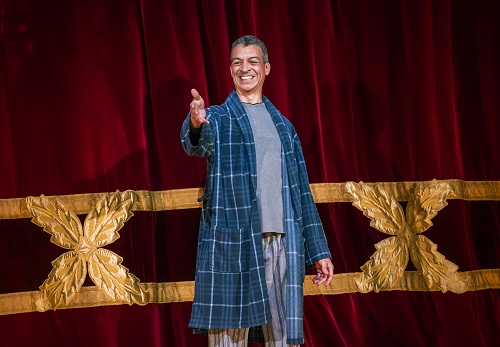
Roderick Williams (c) 2020 ROH, photograph by Tristram Kenton
The ROH Orchestra got things underway with the Overture to Rossini’s La Cenerentola: colours were finely distinguished (some terrifically shapely playing from the woodwind was especially noteworthy), rhythms were razor sharp and amid the fizz of those ‘Rossini crescendos’, here perfectly gradated, the sentimental moments were allowed to breathe. The camerawork offered a rare glimpse of the close working and dynamics of the pit. Wigglesworth balanced frivolity with sensitivity in impressive fashion: Cinderella is the perfect fairy-tale for sad times – acknowledging hardship, promising fulfilment of one’s dreams. After all, who doesn’t want to ‘go to the ball’ at the moment? Williams’ Tiggerish cry, “Yes! Thank you! That’s how to get a party started.” seemed slightly out of tune with Wigglesworth’s insight.
Act 2 of Humperdinck’s Hansel and Gretel took us from dreams fulfilled to darkness threatening. The Witch-Ride was certainly full of menace as Wigglesworth whipped up a stirring musical drama, once more a discerning judge of the emotional palette and pace. However, by the time that the curtain rose and an eloquent solo cello ‘spot-lit’ the tender image of Sophie Bevan’s Gretel tying up tinselly parcels beneath the Forest Tree, it was definitely time for some singing, and Bevan and Hannah Hipp’s Hansel provided an assuaging mix of mischief, childhood fears and musical eloquence. A sparkling red roll of wrapping-paper served first as a sword with which Gretel could honour the brave Hansel after his strawberry-hunting efforts, his red festive bow-badge shining proudly on his chest; then, as a telescope through which to espy the cuckoo calling the children from the depths of the forest.
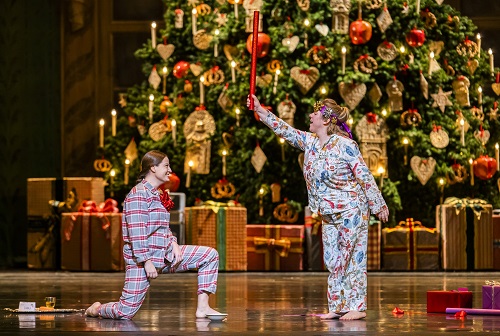
But, as the lights lowered the children’s misdeeds – they’d munched the entire strawberry crop – blended with the forest’s perils, the central tree now just a looming black shape. The ominous timpani time-ticking and anxious clarinet fragments announced the worse: night had fallen, and the children were lost. Fortunately, a saviour was at hand in the form of Jette Parker Young Artist Masabane Cecilia Rangwanasha’s Sandman. Less ethereal and strange than some, this Sandman had a full and rich, bright and very ‘human’ voice which bathed the children – kneeling, eyes eagerly aloft – in its soothing balm. The orchestral Traumpantomime did the work of the absent ‘fourteen angels’, enclosing the sleeping children in its warm, surging and unsentimental embrace. The original orchestration may have been reduced (by Derek Clark) but the power of the music to comfort and protect was as compelling as ever.
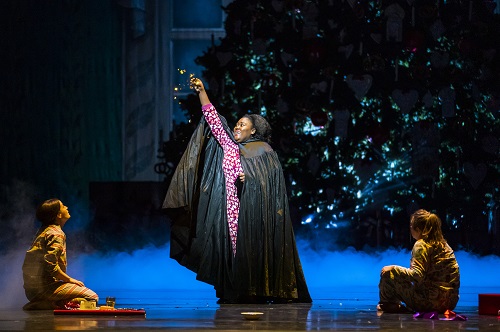
The next curtain-rise transported us from the Märchenoper’s dark spirits to the free spirits of Paris’s bohemians – specifically Act 2 of Puccini’s La bohème. The joie de vivre in Café Momus was power-driven by JPYA Alexandra Lowe’s exuberant, vibrant Musetta, who strutted her stuff to taunt the pitiful, present-laden Alcindoro as the revellers admired her dress (rose pink satin pyjamas) and relished her vivacity and daring. If Lowe stole the show, it was perhaps at least partly because social-distancing rendered everyone else chair-bound, leaving Musetta alone the opportunity to flirt and flaunt – though Williams scurried about as a put-upon café host, alleviating Jeremy White’s gruffly indignant Alcindoro of his gift-tower burden, catching plates flung petulantly by Musetta, and furnishing the bohemians with their gulp-inducing bill at the end of their evening. And, the ROH Orchestra provided the missing restless riotousness on stage, though tempered of course by musical refinement.
There was no chance that Marcello (an open-voiced and transparent-hearted Germán E. Alcántara) would resist this attention-seeking allure of ‘Quando me’m vo’, and even the perceptive observations of David Philip Butt’s Rodolfo and Rangwanasha’s Mimì – and the sensitive interjections of Schaunard (Gyula Nagy) and Colline (JPYA Blaise Malaba) – were overshadowed by Lowe’s vocal peaks and dramatic flamboyance. Her frustrated ‘scream’, when she realises that she just has to get rid of the ‘old man’, really was a ‘high point’ in every sense of the word, and she deftly sent Alcindoro packing – in search of a shoemaker to solve her ‘stiletto’ (aka slipper) bunions. Of current necessity, Musetta and Marcello did not fall rapturously into each other’s arms, but the temperature of the scene was high, and the arrival of the military band sent the mercury climbing still higher. One could not help but feel sorry for the perplexed and pathetic Alcindoro when he returned, bearing a shoe box, to find not a lover but just a monstrous bill awaiting him.
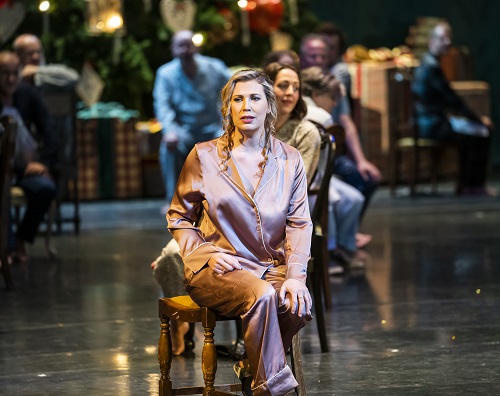
There followed a somewhat disconcerting ‘shift’, as the pensive solo cello which commences Vaughan Williams’ Fantasia on Christmas Carols cleansed the bohemians’ absinthe and antics from the air, and the ROH Chorus returned to their places on Café Momus’s gilt and scarlet chairs, looking more like a devout congregation than debauched carousers, their ‘hymn-books’ a riposte to their preceding hedonism. It was as if we had been time-warped into a very different festive celebration. The words of the first carol, ‘This is the truth sent from above’, were sung with beautiful earnestness by Williams, issuing what seemed an almost direct rebuke to those bohemians who had forgotten the lesson of the fall and redemption of mankind: ‘But they did eat, which was a sin,/ And thus their ruin did begin;/ Ruined themselves, both you and me,/ And all of their posterity.’ The choric hum was a soft and soothing bed of sound, above which Williams told a characteristically telling tale, but Vaughan Williams’ moving medley of Christmas favourites seemed out of place. Williams wandered among the Chorus, wide-eyed with seeming wonder and joy at their vigorous rendition of ‘Come all you worthy gentlemen’. The baritone’s solo, ‘On Christmas night’ (Sussex Carol), was uplifting and the other carols – full and fragments – ‘A Virgin most Pure’, ‘There is a fountain’ and ‘The First Nowell’ segued seamlessly. Musically, there was nothing to fault; curatorially, something had gone amiss.
This was made even more apparent by the spot-on ebullience and cheeriness of the two carols which served as a festive encore to the evening’s music-making: lovely arrangements of ‘The Holly and the Ivy’ (sung by Williams and the ROH Chorus’, and ‘Ding Dong Merrily on High’, in which they were joined by the cast, singing with flushed cheeks and full hearts from the auditorium’s Balcony tier.
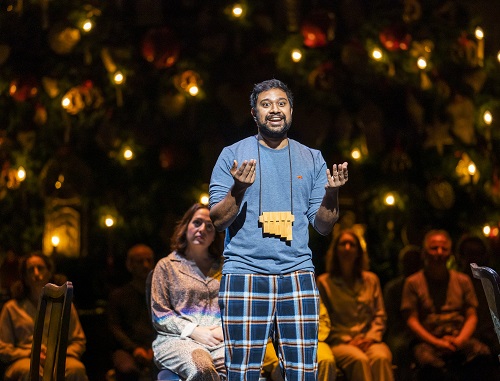
But, a Mozart opera can put anything and everything right, and excerpts from The Magic Flute – the closest opera gets to pantomime, Williams suggested –got the show on the road again, after its slight detour down Vaughan Williams’ earnest avenues. After his persuasive performance in Grange Park Opera’s recent filmed production of Owen Wingrave, Ross Ramgobin was here a personable and confident bird-catcher in ‘Der Vogelfänger bin ich ja’, and he was joined by Sophie Bevan for a delightfully carefree ‘Bei Männern welche Liebe fühlen’; the grace and elegance of Pamina’s soprano line was complemented winningly by Ramgobin’s characterful baritone.
Filipe Manu communicated Tamino’s lovestruck wonder in ‘Dies Bildnis ist bezaubernd schön’, which throbbed eloquently with passion and nobility, the phrasing yearning and reaching, the tone light and youthful. Tamino charmed the beasts in ‘Wie stark ist nicht dein Zauberton’, aided by some delicious dainty and deft flute-playing; Papageno and Papagena (Alexandra Lowe) charmed each other with thoughts of married bliss and multiple Papageno/as in ‘Pa… pa… pa…’.
And, Mark Wigglesworth and the ROH Orchestra charmed us all.
The Royal Opera House Christmas Concert is available on demand at until 17th January 2021.
Claire Seymour
Rossini: La Cenerentola, Overture.
Humperdinck: Hansel and Gretel, Act 2 (Reduced orchestration by Derek Clark)
Hänsel – Hanna Hipp, Gretel – Sophie Bevan, Sandman – Masabane Cecilia Rangwanasha
Puccini – La bohème, Act 2 excerpt (Reduced orchestration by Mario Parenti)
Mimì – Masabane Cecilia Rangwanasha, Rodolfo – David Butt Philip, Musetta – Alexandra Lowe, Marcello – Germán E. Alcántara, Schaunard – Gyula Nagy, Colline – Blaise Malaba, Alcindoro – Jeremy White
Vaughan Williams: Fantasia on Christmas Carols (Roderick Williams, baritone)
Mozart: The Magic Flute, excerpts
Tamino – Filipe Manu, Pamina – Sophie Bevan, Papageno – Ross Ramgobin, Papagena Alexandra Lowe
Staff Director – Dan Dooner, Conductor Mark Wigglesworth, Presenter – Roderick Williams, Set designer – Julia Trevelyan Oman, Lighting designer – Matthew Mulberry, Royal Opera House Orchestra and Chorus
Royal Opera House, Covent Garden London (live stream); Friday 18th December 2020.
ABOVE: The Royal Opera House Christmas Concert (c) ROH 2020, photograph by Tristram Kenton